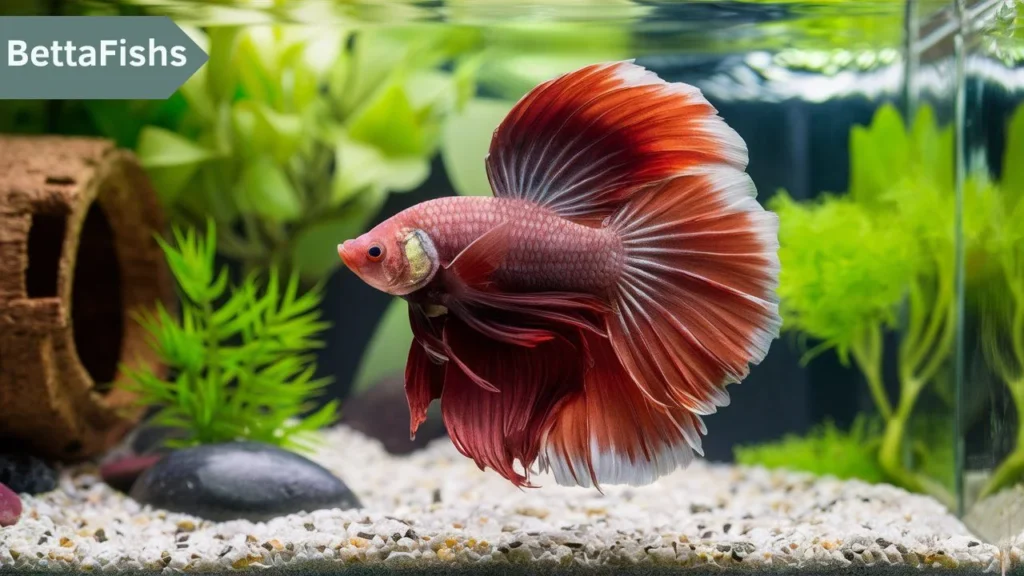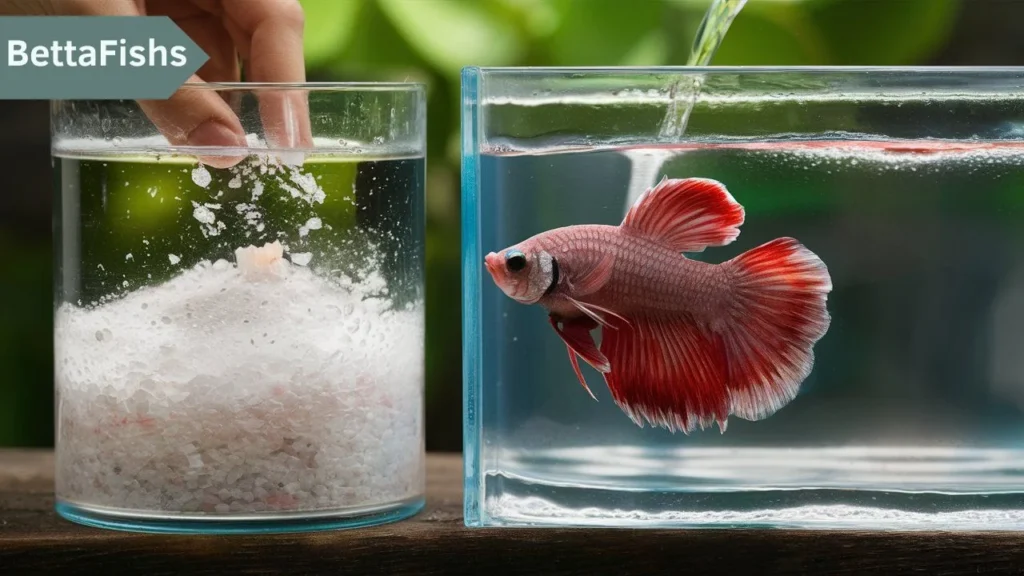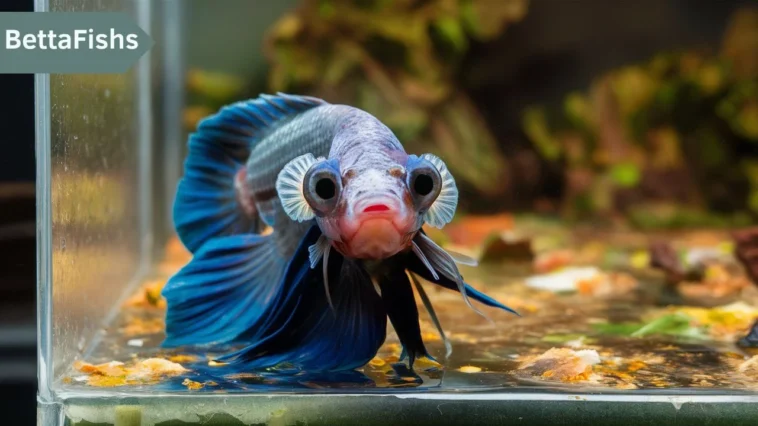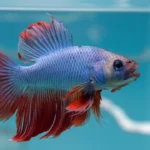Aquarium lovers frequently choose betta fish because of their eye-catching colors and graceful fins. However, like all pets, Betta fish are susceptible to various health issues, one of the most common being Popeye on Betta fish. If you’ve noticed your Betta’s eyes bulging unnaturally, it’s possible that your fish is suffering from this condition.”Popeye on Betta fish ” is crucial for any Betta owner to ensure their fish remains healthy and happy.
What is Popeye in Betta Fish?
Exophthalmia, the medical term for Popeye, is a condition in which one or both of a Betta fish’s eyes protrude abnormally. This bulging is typically due to fluid accumulation behind the eye, leading to swelling. While it might seem like a standalone issue, Popeye is often a symptom of underlying health problems.
Causes of Popeye in Betta Fish
Bacterial Infection
Bacterial infections are a primary cause of Popeye in Betta fish. When harmful bacteria invade the fish’s body, they can cause internal infections, leading to fluid buildup behind the eyes. Poor water quality often exacerbates these bacterial infections, making it crucial to maintain a clean tank environment.
Physical Injury
Physical injuries are another common cause of Popeye. Bettas are known for their aggressive nature, and they might injure themselves while flaring at their reflection or fighting with other fish. Even minor injuries can lead to Popeye if not properly treated, as the damaged tissue becomes prone to infection.
Poor Water Quality
Water quality plays a significant role in the health of Betta fish. Dirty or contaminated water can lead to a host of issues, including Popeye. Ammonia, nitrite, and nitrate levels that are too high can stress the fish, weakening their immune system and making them more susceptible to infections.
Parasitic Infection
Though less common, parasitic infections can also cause Popeye. Parasites can invade the fish’s body and eyes, leading to inflammation and fluid accumulation. These infections often require more specialized treatments than bacterial infections.
How to Identify Popeye in Betta Fish
Visual Symptoms
The most apparent symptom of Popeye is the protrusion of one or both eyes. The eyes may appear cloudy or discolored, and in severe cases, the eye could even rupture. Regularly observing your Betta’s eyes for any changes is key to early detection.
Behavioral Changes
Betta fish with Popeye might display altered behavior. They could become less active, eat less, or hide more frequently. These behavioral changes are often due to the discomfort and stress caused by the condition.
Other Health Indicators
Apart from eye symptoms, other signs like lethargy, loss of appetite, or clamped fins might indicate that your Betta is unwell. Monitoring for these additional symptoms can help in diagnosing Popeye and its underlying causes.

Prevention of Popeye in Betta Fish
Maintaining Water Quality
One of the most effective ways to prevent Popeye is by maintaining optimal water quality. Regular water changes, using water conditioners, and monitoring ammonia, nitrite, and nitrate levels are essential practices. Clean, well-filtered water helps keep your Betta’s immune system strong and resilient against infections.
Proper Nutrition
A balanced diet is vital for preventing Popeye. Bettas need a varied diet that includes high-quality pellets, frozen or live foods like brine shrimp or bloodworms, and occasional vegetable matter. A well-nourished Betta is more likely to resist infections that could lead to Popeye.
Regular Tank Maintenance
Regular tank maintenance goes hand in hand with water quality. This includes cleaning the tank, replacing or cleaning the filter, and removing uneaten food and waste. A well-maintained tank reduces the likelihood of injuries and infections that could cause Popeye.
Quarantine New Fish
Before introducing new fish into your Betta’s tank, it’s important to quarantine them for a few weeks. This practice helps ensure that the new fish are free of diseases or parasites that could spread to your Betta and cause health issues like Popeye.
Treatment Options for Popeye in Betta Fish
Antibiotic Treatment
If Popeye is caused by a bacterial infection, antibiotics are often the most effective treatment. Medications like tetracycline or erythromycin can help eliminate the infection. However, it’s crucial to follow the dosage instructions carefully to avoid harming your fish.
Salt Baths
Salt baths can be a beneficial treatment for Popeye, particularly when the condition is caught early. Dissolve aquarium salt in water and place the Betta in the solution for a few minutes. Salt baths help reduce swelling and fight infection, but they should be administered with caution to avoid stressing the fish.
Isolating the Affected Fish
Quarantining the affected Betta is crucial during treatment. Isolation helps prevent the spread of any potential infections to other tank inhabitants and allows for targeted treatment without contaminating the main tank.
Natural Remedies
Some Betta owners prefer to use natural remedies, such as adding Indian almond leaves or using Epsom salt baths, to treat Popeye. While these remedies can be effective in mild cases, they may not be sufficient for severe infections, so it’s important to monitor the fish closely and seek professional advice if necessary.
Recovery and Aftercare
Monitoring the Betta’s Progress
During recovery, it’s essential to keep a close eye on your Betta’s condition. Look for signs of improvement, such as reduced swelling and a return to normal behavior. Regular monitoring helps ensure that the treatment is working and allows for adjustments if necessary.
Adjusting Tank Conditions
Post-treatment, it’s important to maintain a clean and stable environment to support your Betta’s recovery. Gradually return the tank to normal conditions, ensuring that water parameters are optimal and the tank is free from stressors.
Long-term Care for Recovering Bettas
Even after the visible symptoms of Popeye have subsided, your Betta will require ongoing care to prevent a recurrence. This includes continued attention to water quality, diet, and regular health checks to ensure your Betta remains healthy.

When to Consult a Veterinarian
Signs of Severe Infection
If the Popeye does not improve with home treatment or if the condition worsens, it’s time to consult a veterinarian. Severe cases might require more advanced treatments, such as prescription medications or professional intervention.
Long-term Complications
In some instances, Popeye can lead to long-term complications, such as permanent eye damage or chronic infections. A veterinarian can help manage these complications and provide guidance on the best course of action.
Alternative Treatments
If standard treatments aren’t working, a veterinarian might suggest alternative treatments or more specialized care. It’s important not to delay seeking help, as prolonged infection can significantly impact your Betta’s health.
Common Myths About Popeye in Betta Fish
Misconceptions About Causes
There are many myths about what causes Popeye in Betta fish. Some believe it’s solely due to genetics or poor diet, but in reality, it’s often a combination of factors like water quality, infection, and injury.
False Treatment Beliefs
Not all remedies suggested online are effective or safe. For instance, overusing salt baths or relying solely on natural treatments can sometimes do more harm than good. It’s important to use evidence-based treatments and consult with experts when necessary.
Popeye and Betta Genetics
While genetics can play a role in a Betta’s overall health, Popeye is typically not a genetic condition. Instead, it’s more commonly related to environmental factors and care practices.
Conclusion
Popeye in Betta fish is a condition that can be distressing for both the fish and its owner, but with the right knowledge and care, it is often treatable and preventable. By maintaining good water quality, providing a balanced diet, and responding quickly to any signs of illness, you can help ensure your Betta leads a healthy, happy life.
FAQs
Can Popeye heal on its own in Betta fish?
Yes, in some mild cases, Popeye can heal on its own, especially if the underlying cause, such as poor water quality, is addressed quickly. However, treatment is often necessary to prevent complications.
How long does it take for Popeye to heal?
The healing time for Popeye can vary depending on the severity of the condition and the effectiveness of the treatment. It can take anywhere from a few days to several weeks.
Is Popeye contagious to other fish?
Popeye itself is not contagious, but if it’s caused by a bacterial infection, the bacteria could potentially spread to other fish. Quarantining the affected fish is important to prevent the spread of infection.
Can Popeye be fatal for Betta fish?
If left untreated, severe cases of Popeye can lead to complications that may be fatal, such as eye rupture or systemic infections. Prompt treatment is crucial to prevent these outcomes.
What should I do if my Betta has recurring Popeye?
Recurring Popeye may indicate an ongoing issue with tank conditions or the presence of chronic infection. It’s important to reassess your tank setup, water quality, and diet, and consider consulting a veterinarian for further advice.




